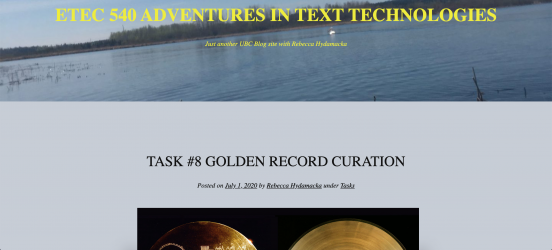I've really enjoyed the blog space approach in this course. Completing a weekly task is only half the fun. The rest comes from browsing through and engaging with other people's posts. The variety in our approaches and thoughts on the same assignment never fails to amaze and intrigue me, and I always close each window with my mind spinning with new ideas. For my linking assignment, I have selected posts that I found myself thinking about long after reading and commenting on them.
Link 4
For my fourth link, I went back to Rebecca Hydamacka’s Week 8 post on the golden record curation. The original can be viewed below.
Rebecca has been a wonderful presence in this course. Whilst I do find it difficult to sometimes search for posts on her sites, her writing style is very approachable and her honest reflections about her experiences during these tasks makes it feel ok to having feelings and not just academic opinions on them. I really appreciated that, as these online spaces can sometimes become overly formal, and subsequently intimidating to participate in. So having someone who said it like it was whilst also making succinct insights and poignant reflections about the tasks at hand was a welcome approach.
In this particular blog, there were two major things that stood out to me.
The first, was the questions. I am a true believer in a good question having more impact than a good answer sometimes, and I think this post really highlighted that for me. I personally sat and struggled with this task, trying to determine many of the same parameters that Rebecca outlined. Things like:
What does one include and what does one exclude? Are we looking to represent all cultures? Or countries? No . . . not countries as they are often defined by arbitrary borders that change with conflict. Styles and genres of music? Rhythms? Voices? Instrumentation? Back to the task, whose view do we go from? A Euro-Western perspective? Who’s history are we telling and who’s are we leaving out? Should the recordings be taken from a more contemporary stance of the recognition and inclusion of cultures?
These questions are important because they are part of analysing what our motivations are for selections. I am, at the heart of it, someone who prides themselves on being an epistemologist. I love thinking about thinking, and I think it’s one of the most important skills we can give a person. Seeing Rebecca’s questions made me feel a little more comfortable about the fact that I struggled with these same things. It also just made me smile to see someone else so dedicated to investigating the ‘why’ as well as the ‘what’. Furthermore, there is such value in this from an educational perspective. Valuing questions, and teaching students how to ask good questions, are probably one of the most powerful parts of pedagogy. When teachers model this by asking questions themselves, and adults stepping down from the ‘I know’ position to query things instead, we slowly move towards a 21st century world.
The second, was Rebecca’s temptation to make lottery selections. This is such a great insight for this task! At the end of the day, it is almost as if we were all duped into making this an immensely personal task because we were asked to justify our choices. However, there was no specification that we couldn’t employ something like a lottery selection, and justifying that as the fairest approach because it removes all personal bias out the equation. It honestly hadn’t even crossed my mind, even though I experienced not feeling like I had the right reasons to make a selection of 10, and when reading her statement in this blog it felt so profound!
There were other things that Rebecca discussed that were included in my process as well, such as the historical context of the record and how much has changed since then, and I just enjoyed reading it overall. It affirmed a lot for me, whilst still extending my understanding with new ideas and perspectives.
